Synergistic Research PowerCell 12 UEF SE AC Conditioner

 We’ve all heard the phrase….”Power to the People.” Right? Even though previously this has been more often related to civic advocacy, what I’m referring to now is something more so pertaining to the advocacy for audiophiles and music lovers. Specifically, I’m referring to the enhancement of power conditioning for our cherished high-end audio systems. In fact, I believe it’s appropriate to give a salute to those companies that are focused on bringing power, clean power, great power to our beloved audio systems. That’s the good news.
We’ve all heard the phrase….”Power to the People.” Right? Even though previously this has been more often related to civic advocacy, what I’m referring to now is something more so pertaining to the advocacy for audiophiles and music lovers. Specifically, I’m referring to the enhancement of power conditioning for our cherished high-end audio systems. In fact, I believe it’s appropriate to give a salute to those companies that are focused on bringing power, clean power, great power to our beloved audio systems. That’s the good news.
On the flipside, there is a definite challenge due to needing to sort through the noticeably differing technological approaches between manufacturers and ultimately deciding what you believe will work best for your particular system. Sorry folks – no single solution or silver bullet when it comes to power conditioning. Along with this – prices vary accordingly and ranging from relatively modest levels to mid/upper four-digit range and above.
For this particular review, my attention is focused on the latest iteration of Synergistic Research’s already highly acclaimed PowerCell AC power conditioner. The unit under review is the PowerCell 12 UEF SE (aka PC12). Also, as a point of reference, over the past three years or so, I’ve had the good fortune of experiencing this company’s earlier PowerCell 10 SE power conditioner (PC10) in my system and with very positive results. Prior to that, I’ve had various other AC power conditioners in my system, each with its own set of attributes. However, once the earlier Synergistic Research AC power conditioner was installed in my system, the level of improvement back then was so significant that it was literally a game-changer. Another way of saying it is perhaps this way…..”in the past, I’ve had good power, sometimes really good power and I’ve also had great power. I definitely much prefer great power.” Based on my more recent experiences, the newer Synergistic Research PowerCell is reflective of the latter part of this statement and perhaps even more.
Background Perspectives
 In terms of my exposure to Synergistic Research and its range of products, over the past several years, I have had a number of opportunities to check out demonstrations by the company’s chief designer and lead guru Ted Denney. These events were typically conducted during different high-end audio shows across the country. And, whether it was a demo focused on the company’s cables or various types of room treatments (i.e., wall panels, tuning devices, other), my reaction has always been quite positive and often of amazement. In fact, the effectiveness of these demonstrations has to be seen/heard to be believed. I also marvel at how Denney typically runs all of his system’s electronics through a single PowerCell power conditioner and with no observable negative sonic effects.
In terms of my exposure to Synergistic Research and its range of products, over the past several years, I have had a number of opportunities to check out demonstrations by the company’s chief designer and lead guru Ted Denney. These events were typically conducted during different high-end audio shows across the country. And, whether it was a demo focused on the company’s cables or various types of room treatments (i.e., wall panels, tuning devices, other), my reaction has always been quite positive and often of amazement. In fact, the effectiveness of these demonstrations has to be seen/heard to be believed. I also marvel at how Denney typically runs all of his system’s electronics through a single PowerCell power conditioner and with no observable negative sonic effects.
More recently, actually during the 2018 Axpona North America Audio Show in Schaumburg, IL, I finally had an opportunity for a formal introduction to Denney along with several of the Synergistic Research team members who were present at the show. Fortunately, I was able to participate in an after-hours demo/audition of his reference system for the show along with the opportunity to witness for myself the impact of the different types of devices designed and manufactured by this company. Without going into detail, all I can say is that progressing through each product, both singularly and collectively was truly a revelation. And, get this – everything demonstrated was some sort of passive device. Nothing placed in the signal chain or connected to the wall AC. That is except for the mighty PC12 doing its duty in providing clean power to the electronics. At times I almost felt like the proverbial kid in a candy shop as I listened and watched.
Anyway – this is where reality sets in and discussions around a possible review started to emerge. But the question of where to start wasn’t quite so obvious. Fortunately, standing nearby and also participating in these discussions was Denney’s right-hand person Andy Wiedersphan, Director of Operations. Andy was, and continues to be, very helpful and before he would even suggest where we should start, he encouraged me to finish my listening at the show, then get back to him after the show with a list of my current reference system components including cables, power conditioning, room treatment, other. He assured me that once he had this information, he would then determine the best approach for a review. Needless to say – I followed up with him promptly after getting home.
Shortly after he received this information, along with several email exchanges and a few phone conversations, he clearly stated that the very best place to start would be with the newer PC12. His reasoning was that since all electronics were connected to this critically important device, perhaps the single most important change I could make to my existing system would be to start at the power source. Plus, since I already had the company’s earlier PowerCell10 SE in place, this all seemed quite logical despite my quiet lusting over some of those crazy good (and very expensive) top of the line cables in the SR arsenal. From this point, the only thing for me to do was wait for news regarding a pending shipment date. Fortunately the wait was relatively short and soon I had in my possession a spanking brand new PC12 power conditioner. This unit comes standard with a special high current Level 3 Atmosphere Active detachable power cord that separately retails for $2,995.95. As I’ve learned over the years, the cable that connects the power conditioner to the wall AC can have a noticeable impact on everything that follows. To this end, SR has done something very right in providing this upgraded AC power cord with the newer unit. By the way – there is also an upgradeable power cord for the PC12 as well. More about that later.

Interestingly, about the same time that all these conversations were taking place, and while visiting family in Southern CA, I was able to arrange a visit to the Synergistic Research facility located in Santa Ana, CA. Definitely an enjoyable, and enlightening, visit including a tour of the manufacturing plant and review of some of the company’s special R&D areas. This included a review of various techniques used in the product design, development along with testing and measurement processes to ensure that the product’s performance fully complies with the specifications. Additionally, I had an opportunity for being introduced to the various SR team members. Final stop was a listening session in the coveted room where critical listening is done as the final step in the process for assessing the product’s overall performance. The room consisted of the Magico S3 loudspeakers ($85K) mated to McIntosh electronics (i.e., tube preamp, solid state mono block amps). Beyond that – the room had an array of various SR devices including cables, room treatment and for sure the mighty PC12 UEF SE providing clean power to the electronics.
In conversation while there with Denney, I inquired as to why he didn’t use perhaps more exotic, upper end electronics – those that were perhaps considered top-tier. His immediate response/comment was that it was relatively easy to make great sound with truly great equipment. Further, his reasoning behind using electronics other than those that were astronomically priced, was to provide him with the ability to hear how his products worked in systems that included electronics that were perhaps more mainstream vs. those with at the very top of the product hierarchy – both in terms of price and performance. Interesting perspective and to me, that made a lot of sense.
Products Arrived – Initial Impressions
OK, getting back to when the newer PC12 arrived – as much as I was anxious (or should I say tempted?) to check it right away, I hesitatingly heeded the advice provided by Andy and provided some time for burn-in and conditioning of both the unit and its companion power cord. In fact, not only did I follow his advice, rather than possibly short change the burn-in period, I actually allowed five full days of continuous AC running thru both devices. This included connecting the PowerCell to a spare component to allow the flow of AC all the way through the unit’s circuitry. Finally when the day of reckoning arrived – the only change that would take place was for me to replace my existing PowerCell 10 (and its companion power cord) with the newer PC12 and its power cord.
The result of making this change was something along the lines of a….”are you kidding me” kind of experience. This newer unit, along with its companion detachable Atmosphere Level 3 power cord was simply a much different animal than my reference unit and well beyond my expectations. The level of refinement was clearly obvious along with a very noticeable sense of enhanced quiet as well as an ability to more easily hear into the sound stage. Beyond that, there was also a level of smoothness to the music that was clearly an improvement over my reference unit. This is not a statement to suggest that transients seemed to be shaved off but more so revealing of a more natural quality to the music.
In terms of overall dynamic impact, thrust, and the sometimes illusive jump factor, all across the frequency spectrum, was improved and by no small degree. Bass sounded as if it went lower with improved bloom, fullness, impact and articulation. The midrange was definitely clearer, more flushed out than before and with a more organic feel to the music. Along with this, music through the midrange had an enhanced natural character and musical beauty. Higher frequencies were now more open, clear, pristine and with an enlightened sense of free air. All and all – it was as if the entire musical picture had been meticulously cleaned as well as somehow receiving a greater sense of power, finesse and realism. Clearly I was startled and very much in a good way. The thought that over the next week or so there would likely be continuous improvement was hard to believe but I was fully ready for the journey.
Later that evening – as what happens often in our household, my wife ventured into our listening room and asked what was going on. I didn’t say much at first hoping to get her raw reaction before revealing anything. She quickly remarked that as much as she had been enjoying the system before – there was now something clearly, and obviously, different and that she really liked what she heard. As it turned out – we retreated to the kitchen, picked up the dinner that she had prepared and immediately retreated to the listening room. Fortunately neither of us had any specific plans, commitments or hard deadlines for the next morning and allowed the listening session to extend well into the night. When the sound is right and the music is good – that’s definitely a winning combination.
Cosmetics & Technical Description
Regarding the overall appearance of the newer PC12 – although the general appearance, including size and overall dimensions, at a glance is quite similar to the earlier PC10. However upon closer inspection – you will notice that the newer PC12 has an updated and more refined look and feel. Also, whereas my older unit had a Plexiglas outer casing, the newer unit’s chassis is made of high carbon steel with the faceplate also being much more substantial. White lettering remains on the lower left and right front as before. One noticeable difference is the clear top cover on the SE version. This allows you to peer into the innards of the unit. With a soft somewhat muted blue lighting inside, it definitely enhances the looks with greater eye appeal than simply a plain black box.
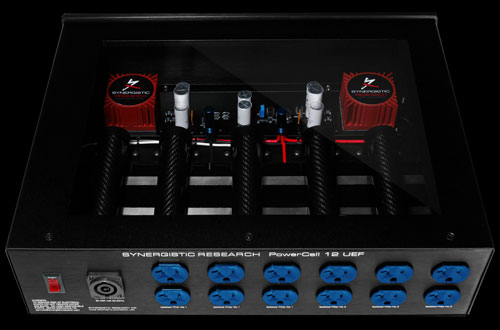
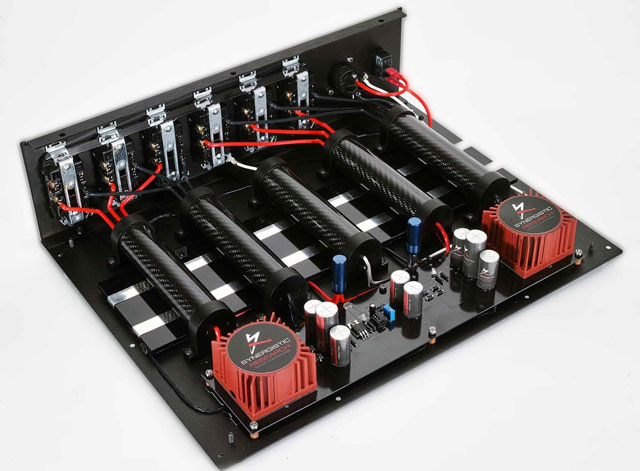
 In terms of goodies inside, during a conversation with Andy one afternoon, I asked that he simply help me understand what the key differences were between the former PC10 and the newer PC12. Critically important is the use of Graphene (i.e., super conductor) that significantly increases efficiency of the patent pending Electromagnetic Cells (EM). Without going fully into this technology, one of the benefits is a reduction in the noise floor along with increased dynamic headroom. Another key difference between the PC10 and PC12 is an increase from one single flat EM Cell to multiple EM Cells (i.e., six total). The EM Cells are used to condition the power and importantly without limiting the current. Essentially this has a tripling affect for conditioning to the power. This EM Cell technology is coupled to the Ultra Low Frequency Generator (UFL) that reclocks the EM Cells with a low frequency harmonic essentially eliminating 60-cycle noise. Additionally, another important revision incorporated into the SE version is the use of 10 gauge point-to-point wiring from the EM Cells to each duplex. This provides superior isolation and lowers the noise floor as well as minimizing/eliminating cross contamination. There’s also now a solid silver ground strap as well. As stated in the PC12 literature….“absolutely nothing is added to the signal path – no chokes, no transformers, and no parallel circuits hinder the speed and AC power level that your components require to perform at their absolute optimum.”
In terms of goodies inside, during a conversation with Andy one afternoon, I asked that he simply help me understand what the key differences were between the former PC10 and the newer PC12. Critically important is the use of Graphene (i.e., super conductor) that significantly increases efficiency of the patent pending Electromagnetic Cells (EM). Without going fully into this technology, one of the benefits is a reduction in the noise floor along with increased dynamic headroom. Another key difference between the PC10 and PC12 is an increase from one single flat EM Cell to multiple EM Cells (i.e., six total). The EM Cells are used to condition the power and importantly without limiting the current. Essentially this has a tripling affect for conditioning to the power. This EM Cell technology is coupled to the Ultra Low Frequency Generator (UFL) that reclocks the EM Cells with a low frequency harmonic essentially eliminating 60-cycle noise. Additionally, another important revision incorporated into the SE version is the use of 10 gauge point-to-point wiring from the EM Cells to each duplex. This provides superior isolation and lowers the noise floor as well as minimizing/eliminating cross contamination. There’s also now a solid silver ground strap as well. As stated in the PC12 literature….“absolutely nothing is added to the signal path – no chokes, no transformers, and no parallel circuits hinder the speed and AC power level that your components require to perform at their absolute optimum.”
Needless to say, there is much more to the newer design and incorporation of SR’s patented technologies in PC12 and for additional detailed information, I suggest you refer to the SR website. Operationally, the PC12 is pretty much straight-forward with an on/off switch, twelve duplex outlets (isolated) and a Neutrix bayonet connector for the unit’s power cord, located on the back panel. Additionally, there are several different versions of the PC12 and at slightly lower price-points. Again, check the company’s website for details.
Listening, Listening, Listening
Earlier in this review, I provided a few high-level, generalized comments about my very positive and enthusiastic reaction to the level of improvement in the overall sound of my system with the new PC12 in place. In fact, I don’t recall a time when something has had such a significant and profound impact on literally every aspect of my system’s overall sonic performance. Basically everything that was good before immediately became noticeably better. In a very real sense, this was very much like a transformative experience and clearly observable to even a casual listener. It was now the purity of recorded music that stepped forward with more life and vitality than ever before. At the same time, there was a more natural tonality and organic richness to the music. Not in a syrupy way but in a way that made the music, all music – instrumental, vocal, electronic, other, more accurately portrayed and lifelike. And while my system isn’t perfect – it is nonetheless a highly resolving, highly musical and most enjoyable system that provides significant listening pleasure to all who partake.
Improving the quality of power through the sophisticated filtering and conditioning technology contained in the PC12 very effectively provided a platform where increased resolution was clearly obvious. This along with the noise floor being even further lowered than my previous PC10 literally opened the soundstage where music simply flowed from a black, transparent background. Interestingly, rather than providing detail overload, this actually increased my level of enjoyment whereas not only was the primary music source clearly evident, many of the subtle clues that come with an artists’ performance became evident as well. Being able to listen into the music provides a wonderful sensation and actually allows you to relax while listening. No need to strain or lean forward – just sit back, relax and enjoy the sounds coming to you freely and effortlessly. This is the overall sonic character of the PC12.
Additionally, there is now a sense of unrestricted space along with a lack of constriction or dynamic limit. When the music calls for it – you easily hear the swell of expansion including macro dynamics at their best. Also micro cues, voices and instruments that are normally buried in the noise floor come forth fully expressed even in soft passages. Layering is even better than before with the ability to clearly distinguish between the performing artists within the musical passages. Fortunately, this all comes through sounding natural and organic – not at all bright. Equally impressive is the ability to hear vocals—so clearly enunciated and distinguishable. A stand out example is the recording by the wonderful gospel acapella group Fairfield Four. On their CD titled “I Couldn’t Hear Nobody Pray” their voices are clear, clean, distinct and loaded with harmonic richness arrayed in space accurately. As a result, you can easily hear each singer in relationship to the other. My assessment on transparency is that the PC12 is helping by cleaning away some kind of hash on the AC line allowing me to hear deeply into recorded music including artifacts, instrumentation and spatial cues in the recordings. Additionally, height and distance between vocals, backgrounds, instrumentation and even engineering tricks are now easy to pick out and follow.
 Other standout and favorite recordings of mine include the wonderful song stylist Ms. Nancy Wilson with her CD titled “With My Lover Beside Me.” This is a lush musical presentation with music written by Barry Manilow and lyrics by Johnny Mercer. Throughout this recording, there are times when Wilson’s voice swells, swerves, dips low, rises, softens and whispers all with a musical accompaniment that ebbs and flows. Both the title tune and the selection titled When October Goes from this same recording benefit from the cleaner, pure sound provided by the SR PC12. Along with enhanced sound staging and revelation of subtle music clues, the changing dynamics within the music emerge wonderfully and so very naturally.
Other standout and favorite recordings of mine include the wonderful song stylist Ms. Nancy Wilson with her CD titled “With My Lover Beside Me.” This is a lush musical presentation with music written by Barry Manilow and lyrics by Johnny Mercer. Throughout this recording, there are times when Wilson’s voice swells, swerves, dips low, rises, softens and whispers all with a musical accompaniment that ebbs and flows. Both the title tune and the selection titled When October Goes from this same recording benefit from the cleaner, pure sound provided by the SR PC12. Along with enhanced sound staging and revelation of subtle music clues, the changing dynamics within the music emerge wonderfully and so very naturally.
 Another wonderful recording regularly in rotation at my place is produced by elder statesman and jazz saxophonist Houston Person. His CD titled “Person-ified” has a superb recording quality through the excellent engineering and recording technique by Rudy Van Gelder. Person’s big, warm, engaging sax emerges with beautiful tonality and authentic dimensionality from a superbly deep black, super quiet, wide open, clear soundstage with lots of textured, organic realism. Along with this – the overall rhythmic flow and dynamic thrust of the music is ever present while shifting from soft subtle blowing to deep bluesy throbbing sounds and more quick, uptempo sounds. All tracks on this recording are done very well with perhaps one of my favorite selections being the track titled “Detour Ahead.” Again, from my experience with the SR PC12 in place, the overall clarity, precision and quality of sound has definitely been improved and enhanced beyond the predecessor SR PC10.
Another wonderful recording regularly in rotation at my place is produced by elder statesman and jazz saxophonist Houston Person. His CD titled “Person-ified” has a superb recording quality through the excellent engineering and recording technique by Rudy Van Gelder. Person’s big, warm, engaging sax emerges with beautiful tonality and authentic dimensionality from a superbly deep black, super quiet, wide open, clear soundstage with lots of textured, organic realism. Along with this – the overall rhythmic flow and dynamic thrust of the music is ever present while shifting from soft subtle blowing to deep bluesy throbbing sounds and more quick, uptempo sounds. All tracks on this recording are done very well with perhaps one of my favorite selections being the track titled “Detour Ahead.” Again, from my experience with the SR PC12 in place, the overall clarity, precision and quality of sound has definitely been improved and enhanced beyond the predecessor SR PC10.
Beyond these fine examples of tasty music, I can easily state that whether I was listening to Kurt Elling’s wonderful vocals on his superb recording titled “Nightmoves,” or someone like the spirited and late great jazz pianist Gene Harris on his recording titled “It’s The Real Soul,” the improvements rendered with the PC12 in my system were there in spades. Also as I mentioned earlier in this review, this type of listening experience extended way beyond just me listening solo and for anyone who happened to stop by our home with an opportunity to listen, either casually or perhaps more intently, their comments were consistently positive and often with wonderment regarding the realism of the sound. In fact, many who were familiar with recordings that I played – often commented that they almost didn’t recognize the recording as being the same that they had listened to before hearing it through my system. Instantaneous in-home concerts often resulted once the listening began with numerous requests from those present.
Conclusion

Over the years, power conditioning has become a more recognizable, valued and important aspect of sonic improvement for high-end audio systems. Also, due to significant technological improvements made in this area, there is no longer the need for you to have to wait for those so-called magical moments when the incoming AC is just right (i.e., late night or wee hours of the morning) and for the ultimate listening experience. With the Synergistic Research PC12 UEF SE power conditioner, I was able to experience magical moments whenever I listened to my system. In fact, at no time throughout my time with this unit did I experience any sort of variation or degradation in the sound that I would attribute to changing AC quality. In fact – it was all good.
Essentially, the PC12 performed sonically beyond my expectations and without any sort of operational glitch. In terms of how I would rate this particular product – basically, it’s overall performance improvement capabilities easily make it a no-brainer. In fact, I was stunned to say the least. Throughout this review, I have tried to describe, as best I can, the improved level of musical reproduction through my system with the PC12 in place. Bottom line, I couldn’t help but marvel at how the PC12 so effectively got out of the way and provided such an impressive platform of high quality conditioned AC to my system. As I said…”Power to (and for) the People!” Highly recommended for sure.
Post Script
Introduced to me later in the review process was an optional upgraded power cord as replacement for the standard power cord for the PC12 (i.e., $2,995.00). This particular cable is from the highly acclaimed Galileo series and is stunning within its own abilities. Importantly, as a result of inserting this upgraded power cord, I have even that much more appreciation for the impact of the cord that connects the PC12 to the wall AC. Essentially, with the Galileo power cord in place – literally everything that I described in this review has been enhanced and not by a small margin.


bill wells

 When I spoke with Bill Wells some months ago, I had no idea he, like several others here, possessed the Synergistic Research PowerCell 12 UEF SE. I would seem to have been the last guy at Stereotimes to audition the latest offering from Ted Denney. Not only did Bill and I end up having the same power conditioners, we both had a “You’ve got to be kidding me” surprise at its overall performance. I’ve known Bill for well over 25 years and if memory serves, we’ve never before owned the same gear. Except once in 2001 when we both had Bel Canto eVo amplifiers.
When I spoke with Bill Wells some months ago, I had no idea he, like several others here, possessed the Synergistic Research PowerCell 12 UEF SE. I would seem to have been the last guy at Stereotimes to audition the latest offering from Ted Denney. Not only did Bill and I end up having the same power conditioners, we both had a “You’ve got to be kidding me” surprise at its overall performance. I’ve known Bill for well over 25 years and if memory serves, we’ve never before owned the same gear. Except once in 2001 when we both had Bel Canto eVo amplifiers.
Yet, here we were seventeen years later, talking about our new PowerCell conditioners. And we couldn’t stop gushing over its neutrality, speed, dynamic prowess, tonality and realism. Bill had compared his unit against an older model SR conditioner and as one would expect, the new unit was better. But how it performed against a respected $12,000 conditioner from Europe was disconcerting. Now, the SR PowerCell isn’t inexpensive; with the Level 3 AC cord (HIGHLY RECOMMENDED) the cost reaches $6,500. That’s a lot of bread, dear reader, but it’s around half the price of the European conditioner, which, as it happens, I have been using as a reference for the past four years. I was astounded at how much better the Synergistic unit was with only the level 3 AC cord. When Andy Wiedersphan, Synergistic Research’s Director of Operations, contacted me some weeks later about the idea of hearing the Galileo SX power cord upgrade, I couldn’t resist. At at total asking price of $9500, it really is expensive, but keep in mind dear reader, the SR PowerCell 12 SE plus the Galileo SX power cord still remains $2,500.00 below the price of my reference European AC conditioner it handily outclassed even with the Level 3 AC cord.

Used as a center hub for my entire audio system, few things can be as impactful as an AC conditioner. A pair of Behold Audio BPA-768 amplifiers, its matching APU-768 preamp and the Laufer Teknik 64 Memory Player were plugged into the SR PowerCell 12 UEF SE using the latest Hemingway Audio Creation S AC cords. I noticed an increase in frequency extension and dynamics. Bass sounded deeper, quicker and more natural through the Sunny Majestic horn loudspeakers. Dynamic swing, pace, rhythm and timing became quicker afoot. The treble region became quieter with greater harmonic decay and delicacy. For example, cymbals have more shimmer and sparkle, more presence and authenticity. I sat there, jaw agape, wondering how this conditioner could make my system sound so much better?
Then I discovered a clue. I have been a big fan of Jack Bybee’s products for years. Lately he has introduced graphene (a single-layer allotrope of carbon, less dense but more conductive than copper) into his solder. Graphene’s potential improvement to electrical circuits are said to be astronomical by those in the know. It was a huge surprise when I learned that graphene is also used by Synergistic Research in their PowerCell 12 UEF SE.

 Then the Galileo SX power cord arrived. It’s been about a month of enjoyment via the Level 3 power cord, so this would prove to be interesting as I wondered aloud how could this get better than it already is? At first blush, the Galileo SX presented a sweeter and a tad more relaxed soundstage. Images had greater density and specificity as though they were being presented in higher resolution. Gregory Porter’s “Take me to the Alley” for example became even more realistic in terms of color and richness. The sweetness I first detected kept recurring over the course of many listening sessions. But that sweetness was a bi-product of the Galileo SX having less resistence and thus stress. Understand me, you do not get that impression listening to the Level 3 power cord at all, until you compare the two. Once you do that, it’s pretty easy to tell the Galileo SX is just performing at another level. Hence, its asking price.
Then the Galileo SX power cord arrived. It’s been about a month of enjoyment via the Level 3 power cord, so this would prove to be interesting as I wondered aloud how could this get better than it already is? At first blush, the Galileo SX presented a sweeter and a tad more relaxed soundstage. Images had greater density and specificity as though they were being presented in higher resolution. Gregory Porter’s “Take me to the Alley” for example became even more realistic in terms of color and richness. The sweetness I first detected kept recurring over the course of many listening sessions. But that sweetness was a bi-product of the Galileo SX having less resistence and thus stress. Understand me, you do not get that impression listening to the Level 3 power cord at all, until you compare the two. Once you do that, it’s pretty easy to tell the Galileo SX is just performing at another level. Hence, its asking price.
 In short, the SR PowerCell 12 UEF SE is a breakthrough in what one can expect from an AC line conditioner. It moved my system in a direction that I have always admired and desired. How it improves specific areas like quiet, dynamics, bass and high frequency extension is very apparent. But overall, I would say that the SR PowerCell 12 UEF SE provides a level of sonic purity superior to any AC conditioner I’ve heard. With all the tweaks that Ted Denney has on tap, namely that SR Grounding device, I’m certain this is not going to be the last article you’re going to read from me. As it stands, the SR PowerCell 12 UEF SE is the finest AC conditioner to have graced my listening space. I could not recommend this product more highly and easily my 2018 Publisher’s Choice, Most Wanted Component!
In short, the SR PowerCell 12 UEF SE is a breakthrough in what one can expect from an AC line conditioner. It moved my system in a direction that I have always admired and desired. How it improves specific areas like quiet, dynamics, bass and high frequency extension is very apparent. But overall, I would say that the SR PowerCell 12 UEF SE provides a level of sonic purity superior to any AC conditioner I’ve heard. With all the tweaks that Ted Denney has on tap, namely that SR Grounding device, I’m certain this is not going to be the last article you’re going to read from me. As it stands, the SR PowerCell 12 UEF SE is the finest AC conditioner to have graced my listening space. I could not recommend this product more highly and easily my 2018 Publisher’s Choice, Most Wanted Component!

clement perry
MANUFACTURER INFORMATION
Name: Synergistic Research
President: Ted Denney
Address: 1736 E. Borchard Avenue, Santa Ana, CA 92705
Tel: 949-476-000
Web Site: www.synergisticresearch.com
E-Mail:service3@synergisticresearch.com
Price: PowerCell UEF SE w/Atmosphere Level 3 power cord, $6495.00
Stereo Times Masthead
Publisher/Founder
Clement Perry
Editor
Dave Thomas
Senior Editors
Frank Alles, Mike Girardi, John Hoffman, Russell Lichter, Terry London, Moreno Mitchell, Paul Szabady, Bill Wells, Mike Wright, Stephen Yan, and Rob Dockery
Current Contributors
David Abramson, Tim Barrall, Dave Allison, Ron Cook, Lewis Dardick, Dan Secula, Don Shaulis, Greg Simmons, Eric Teh, Greg Voth, Richard Willie, Ed Van Winkle, and Rob Dockery
Music Reviewers:
Carlos Sanchez, John Jonczyk, John Sprung and Russell Lichter
Site Management Clement Perry
Ad Designer: Martin Perry




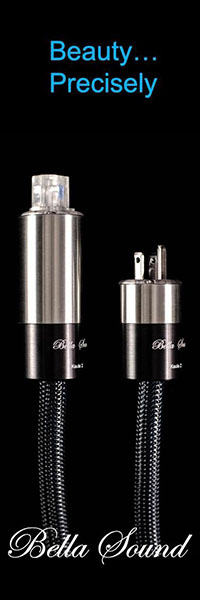
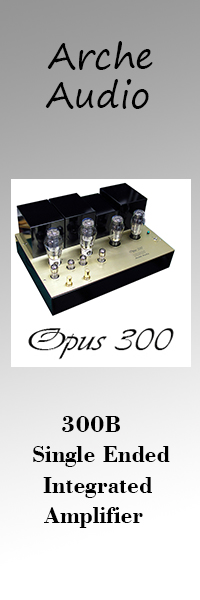
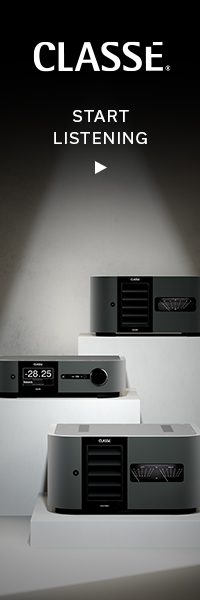
Be the first to comment on: Synergistic Research PowerCell 12 UEF SE AC Conditioner